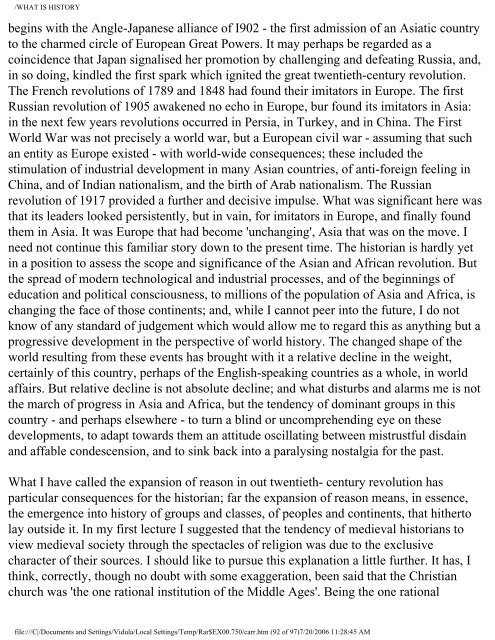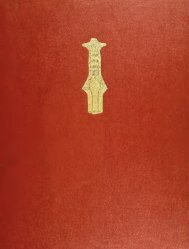What is History / by Edward Hallett Carr - Universal History Library
What is History / by Edward Hallett Carr - Universal History Library
What is History / by Edward Hallett Carr - Universal History Library
You also want an ePaper? Increase the reach of your titles
YUMPU automatically turns print PDFs into web optimized ePapers that Google loves.
WHAT IS HISTORY<br />
begins with the Angle-Japanese alliance of I902 - the first adm<strong>is</strong>sion of an Asiatic country<br />
to the charmed circle of European Great Powers. It may perhaps be regarded as a<br />
coincidence that Japan signal<strong>is</strong>ed her promotion <strong>by</strong> challenging and defeating Russia, and,<br />
in so doing, kindled the first spark which ignited the great twentieth-century revolution.<br />
The French revolutions of 1789 and 1848 had found their imitators in Europe. The first<br />
Russian revolution of 1905 awakened no echo in Europe, bur found its imitators in Asia:<br />
in the next few years revolutions occurred in Persia, in Turkey, and in China. The First<br />
World War was not prec<strong>is</strong>ely a world war, but a European civil war - assuming that such<br />
an entity as Europe ex<strong>is</strong>ted - with world-wide consequences; these included the<br />
stimulation of industrial development in many Asian countries, of anti-foreign feeling in<br />
China, and of Indian national<strong>is</strong>m, and the birth of Arab national<strong>is</strong>m. The Russian<br />
revolution of 1917 provided a further and dec<strong>is</strong>ive impulse. <strong>What</strong> was significant here was<br />
that its leaders looked pers<strong>is</strong>tently, but in vain, for imitators in Europe, and finally found<br />
them in Asia. It was Europe that had become 'unchanging', Asia that was on the move. I<br />
need not continue th<strong>is</strong> familiar story down to the present time. The h<strong>is</strong>torian <strong>is</strong> hardly yet<br />
in a position to assess the scope and significance of the Asian and African revolution. But<br />
the spread of modern technological and industrial processes, and of the beginnings of<br />
education and political consciousness, to millions of the population of Asia and Africa, <strong>is</strong><br />
changing the face of those continents; and, while I cannot peer into the future, I do not<br />
know of any standard of judgement which would allow me to regard th<strong>is</strong> as anything but a<br />
progressive development in the perspective of world h<strong>is</strong>tory. The changed shape of the<br />
world resulting from these events has brought with it a relative decline in the weight,<br />
certainly of th<strong>is</strong> country, perhaps of the Engl<strong>is</strong>h-speaking countries as a whole, in world<br />
affairs. But relative decline <strong>is</strong> not absolute decline; and what d<strong>is</strong>turbs and alarms me <strong>is</strong> not<br />
the march of progress in Asia and Africa, but the tendency of dominant groups in th<strong>is</strong><br />
country - and perhaps elsewhere - to turn a blind or uncomprehending eye on these<br />
developments, to adapt towards them an attitude oscillating between m<strong>is</strong>trustful d<strong>is</strong>dain<br />
and affable condescension, and to sink back into a paralysing nostalgia for the past.<br />
<strong>What</strong> I have called the expansion of reason in out twentieth- century revolution has<br />
particular consequences for the h<strong>is</strong>torian; far the expansion of reason means, in essence,<br />
the emergence into h<strong>is</strong>tory of groups and classes, of peoples and continents, that hitherto<br />
lay outside it. In my first lecture I suggested that the tendency of medieval h<strong>is</strong>torians to<br />
view medieval society through the spectacles of religion was due to the exclusive<br />
character of their sources. I should like to pursue th<strong>is</strong> explanation a little further. It has, I<br />
think, correctly, though no doubt with some exaggeration, been said that the Chr<strong>is</strong>tian<br />
church was 'the one rational institution of the Middle Ages'. Being the one rational<br />
file:///C|/Documents and Settings/Vidula/Local Settings/Temp/Rar$EX00.750/carr.htm (92 of 97)7/20/2006 11:28:45 AM







